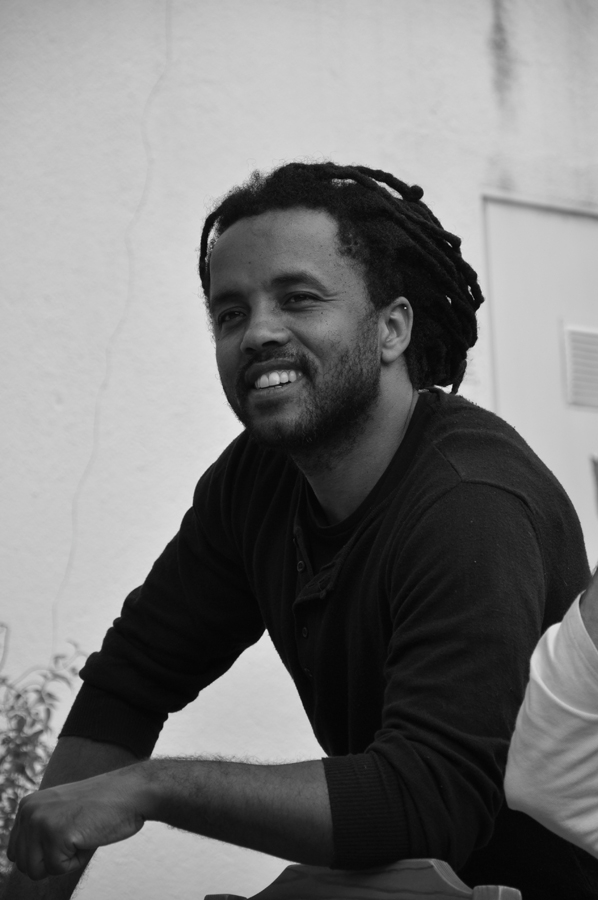ARTREVIEW:
As one of ten shortlisted artists for Artes Mundi 6, you are presenting a project in a large exhibition, taking place across three venues (the National Museum Cardiff – the exhibition’s regular venue –and also at Chapter Arts Centre and Ffotogallery), through 22 February 2015. Could you tell us a bit more about your project and what form it takes?
CARLOS BUNGA:
My project is situated at the National Museum Cardiff. The space is a powerful backdrop for my new, site-specific work entitled Exodus. Exodus is an architectural structure, constructed from ephemeral materials such as cardboard, tape and paint. My intention is that it enables viewers to think about monumentality, history, the construction of a society or sustainability of all things. The ephemerality of the structure speaks of the act or action of beginning, the start of a forced journey to escape a hostile environment to get to another place, hence its title Exodus.
The pre-existing architectural space of the museum has allowed me to explore the temporal and emotional sensibilities of place and how far the character of architecture can exist as experiment. Within this new site-specific installation, I have also placed other works I have created, in the form of paintings, sculptures, drawings and videos. I think that all these pieces function as a living organism, conveying the inter-relationship between doing and undoing, the micro and the macro, investigation and conclusion.
AR: Artes Mundi aims to support ‘contemporary visual artists who engage with the human condition, social reality and lived experience’. How do you feel your work relates to that definition?
CB: The definition of what is or not art is something that will always be debated. However it seems to me that art has a relationship to life. Life is a multifaceted plane of existence; the same can be said for art. “The human condition, social reality and lived experience” is life; a mix of stimuli and interrogations, where constant processes of meaning-exchange take place. The human condition is a fundamental part of our biological process of growth, metabolism and decay. The work I have developed is driven by this process.
AR: Making work which reflects society as it is today can involve some of its most difficult aspects. What role do you think art should or could play in better highlighting or understanding these issues?
CB: We live in a complex contemporary society full of contradictions and confrontations. The world of now is based on the past but is also looking ahead to the future. There are new phenomena, metamorphoses, movements, codes, technologies, internet, power, ideologies, etc. Our society is in a constant state of transformation and change. Art can be understood as a monument related to the idea of memory, or to the idea of bringing time to a standstill, but mankind is inherently afraid of becoming locked in an existence without time, therefore we always insist upon and project life’s eternal transformations; this fear is generated by a need which reflects a feeling of deprivation, a desire for satisfaction.
AR: What has the experience been like to be in a group exhibition such as Artes Mundi? Do you feel particular connections with the other artist’s practices? And what do you think could emerge from this experience?
CB: Being part of Artes Mundi 6 has been an incredible experience. In the prize show there is a strong curatorial focus on how different pieces interact with each other and with the three different exhibition spaces throughout Cardiff. The relationship I have with the other artists is based on this commitment to the social / political / poetic that we can find in all of the works exhibited. I am sure that the experience will lead to lots of open doors to new experiences in the future; I do not know what I’ll find behind each one.
AR: Artes Mundi is the largest monetary prize in the UK, offering £40,000 to the winner. Should you win, how do you plan on using the prize money? Do you have a particular project that you would like to use it to realise?
CB: I am more excited about being part of Art Mundi 6. I do not think the prize is the most important part of the project. The process of selecting the shortlisted artists and choosing the winner is something over which we have no control. I think the most important thing is to focus on the work and to leave the prize part of the project to all the circumstances, casualties, accidents, rationalities, and thinkers that will influence the verdict. The most important thing is to continue working and experimenting. It is important as an artist to always resist, be critical, reflect and try not to be prejudiced. After all, what is true today may tomorrow be a lie and the lie today can turn out to be true!
Artes Mundi 6 will be awarded on 22nd January at a ceremony in Cardiff. The prize show is at National Museum Cardiff, Chapter Cardiff, and Ffotogallery, Penarth until 22 February.
22 January 2015
